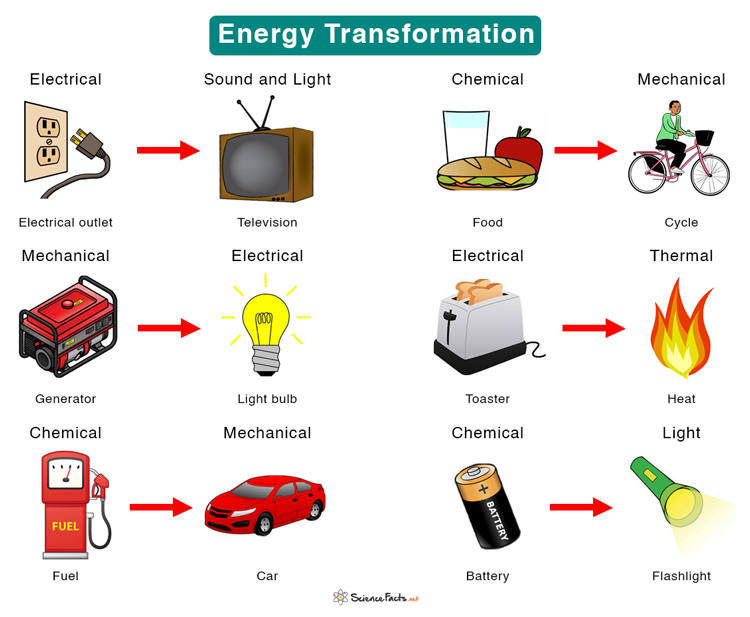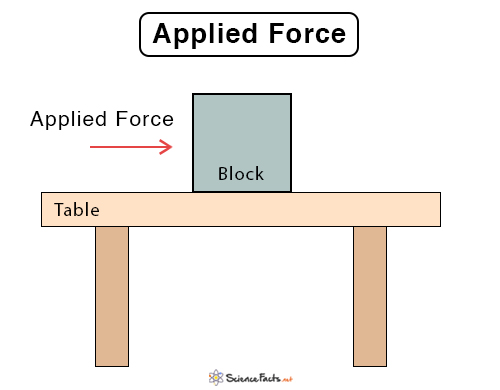Energy Transformation
Energy transformation or energy conversion is the process of transforming energy from one form to another. According to the law of conservation of energy, energy can neither be created nor destroyed. In other words, energy does not appear out of anywhere and disappears into nothing. It transforms from one form into another.
Consider a spring as an example. When it is compressed or extended, the spring stores elastic potential energy. When released, the spring oscillates, and the potential energy is converted into kinetic energy.
Types of Energy Transformation
As mentioned before, energy can transform from one form into another. Below are the types of energy that one can observe in everyday life.
- Mechanical Energy (including kinetic energy and potential energy)
- Chemical Energy
- Electrical Energy
- Thermal Energy or Heat Energy
- Sound Energy
- Light Energy or Radiant Energy
- Nuclear Energy
- Solar Energy
Energy Transformation Examples
Here are some examples of energy transformation in daily life.
- An electric fan, blender, and washing machine consist of an electric motor that converts electrical energy into kinetic energy
- Electric iron, toaster, and stove convert electrical energy into thermal energy
- An electric generator converts mechanical energy into electrical energy
- A television converts electrical energy into sound energy and light energy
- A light bulb converts electrical energy into thermal energy and light energy
- A hairdryer converts electrical energy into thermal energy and sound energy
- The human body digests food and converts chemical energy into mechanical energy enabling muscles to perform work
- A campfire burns wood and converts chemical energy into thermal energy and light energy
- Automobiles use fuel and convert chemical energy into mechanical energy
- The sun transforms nuclear energy into light energy and thermal energy
- Lightning converts electrical energy into light energy, heat energy, and sound energy
- Rubbing hands together converts kinetic energy into thermal energy
- Flashlight converts electrical energy into light energy
- An object speeds up when it falls. Its potential energy is converted into kinetic energy
- A hydroelectric dam converts gravitational potential energy into electrical energy
- A bicycle dynamo converts mechanical energy into electrical energy
- A firecracker transforms chemical potential energy into sound energy and light energy
- A thermoelectric generator is a device that converts thermal energy into electrical energy
- Radio transforms electrical energy into sound energy
- The kinetic energy carried by the wind rotates a windmill to produce electrical energy
- An electrolytic cell converts electrical energy into chemical energy, whereas a voltaic or galvanic cell converts chemical energy into electrical energy
FAQs
Ans. When a skydiver reaches terminal velocity, the potential energy is converted into thermal energy.
Ans. A hot air balloon uses a propane burner to convert chemical energy into thermal energy. The hot air inside the balloon is less dense than the cold air outside. As a result, hot air rises and pushes the balloon upwards, gaining potential energy.
Ans. Energy transfer refers to the movement of energy from one place to another. Energy transformation refers to the energy change from one form to another.
Ans. When a person lifts a chair, chemical energy is transformed into mechanical energy.
-
References
Article was last reviewed on Tuesday, May 17, 2022









too many ads. hard to study and use with all the ads around it
It is a very nice topic
This site says that “Automobiles use fuel and convert chemical energy into mechanical energy”. Doesn’t a combustion engine take the energy from a fuel and convert it into chemical energy and thermal energy as well as the sound energy that is produced from that mechanical energy?
The fuel has chemical energy in it. The combustion engine converts that energy into mechanical, thermal, and sound.
Have scientists considered the possibility that the expansion of water when it freezes could be linked to a deeper, unknown property of the molecules in water? Is there a potential connection to other mysterious phenomena in the natural world?”,
“refusal
The expansion of water when it freezes occurs due to the unique arrangement of hydrogen bonds, which causes the molecules to form an open structure. While scientists have extensively studied this, it’s not yet clear if this behavior is connected to other mysterious natural phenomena.